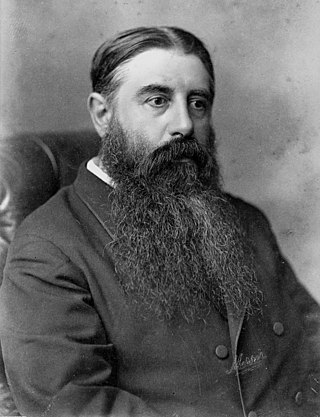Related Research Articles

Sir Julius Vogel was the eighth premier of New Zealand. His administration is best remembered for the issuing of bonds to fund railway construction and other public works. He was the first Jewish prime minister of New Zealand. Historian Warwick R. Armstrong assesses Vogel's strengths and weaknesses:
Vogel's politics were like his nature, imaginative – and occasionally brilliant – but reckless and speculative. He was an excellent policymaker but he needed a strong leader to restrain him....Yet Vogel had vision. He saw New Zealand as a potential 'Britain of the South Seas', strong both in agriculture and in industry, and inhabited by a large and flourishing population.

Sir David Monro was a New Zealand politician. He served as Speaker of the New Zealand House of Representatives from 1861 to 1870.

The Latter-day Saints’ Millennial Star was the longest continuously published periodical of the Church of Jesus Christ of Latter-day Saints, and was printed in England from 1840 until 1970, when it was replaced by the church-wide Ensign. It was primarily aimed at British Latter-day Saints.

Dunedin North is a former New Zealand parliamentary electorate, which returned one Member of Parliament (MP) to the New Zealand House of Representatives. It was established for the 1905 election and has existed since. It was last held by David Clark of the New Zealand Labour Party, who replaced the long-standing representative Pete Hodgson. It was considered a safe Labour seat, with Labour holding the seat for all but one term (1975–1978) since 1928. In the 2020 electoral boundary review, Otago Peninsula was added to the area to address a population quota shortfall; with this change the electorate was succeeded by the Dunedin electorate in the 2020 election.

Thomas Bannatyne Gillies was a 19th-century New Zealand lawyer, judge and politician.
Lyttelton is a former New Zealand parliamentary electorate. It existed from 1853 to 1890, and again from 1893 to 1996, when it was replaced by the Banks Peninsula electorate.
Bruce was a rural parliamentary electorate in the Otago region of New Zealand, from 1861 to 1922. For part of the 1860s with the influx to Otago of gold-miners it was a multi-member constituency with two members.
Waikouaiti was a parliamentary electorate in the Otago region of New Zealand, from 1866 to 1908.
The Gold Fields District electorate was a 19th-century parliamentary electorate in the Otago region, New Zealand. It was created in 1862, with the first elections in the following year, and it returned two members. It was one of eventually three special interest constituencies created to meet the needs of gold miners. All three of these electorates were abolished in 1870. A unique feature of the Gold Fields District was that it was superimposed over other electorates, and voting was open to those who had held a mining license for some time. As such, suffrage was more relaxed than elsewhere in New Zealand, as voting was otherwise tied to property ownership. Another feature unique to the gold mining electorates was that no electoral rolls were prepared, but voting could be done upon showing a complying miner's license.

Charles Thomas Ick was Mayor of Christchurch, New Zealand, from December 1878 to December 1880. Born in Shropshire, he learned the trade of a mercer and draper. The Icks had five children when they emigrated to Otago in 1858. He worked in his learned trade in Dunedin for five years before becoming a farmer in Waikouaiti for seven years. In 1870, he came to Christchurch and set himself up as an auctioneer and later opened a drapery business.
The 4th New Zealand Parliament was a term of the Parliament of New Zealand.
Sir George McLean was a 19th-century Member of Parliament from the Otago region in New Zealand.
John Lillie Gillies was a 19th-century Member of Parliament from the Otago region of New Zealand. He was from Rothesay, Bute on the Isle of Bute, Scotland.
James McIndoe was a 19th-century Member of Parliament from Dunedin, New Zealand.
The 5th New Zealand Parliament was a term of the New Zealand Parliament. Elections for this term were held in 68 European electorates between 14 January and 23 February 1871. Elections in the four Māori electorates were held on 1 and 15 January 1871. A total of 78 MPs were elected. Parliament was prorogued in December 1875. During the term of this Parliament, six Ministries were in power.
John McLeod was a provincial and national politician in New Zealand. He was a member of the New Zealand Parliament for half a term from 1871 to 1873.

The 1875 Pennsylvania gubernatorial election occurred on November 2, 1875. Incumbent governor John F. Hartranft, a Republican, was a candidate for re-election. Hartranft defeated Democratic candidate Cyrus L. Pershing to win another term.

This is a list of members of the Victorian Legislative Assembly, from the elections of 21 January; 7, 20 February 1868 to the elections of 14 February; 3, 16 March 1871. Victoria was a British self-governing colony in Australia at the time.

The Christchurch mayoral election held on 27 November 1878 was contested by the incumbent mayor, Henry Thomson, and senior Christchurch City Councillor Charles Thomas Ick. The election was won by Ick with a large margin.
The 1870 Bruce by-election was held on 21 March 1870 in the Bruce electorate after the resignation of John Cargill during the 4th Parliament.
References
- ↑ "By Electric Telegraph". Evening Star . No. 3248. 18 July 1873. p. 3. Retrieved 17 January 2019.
- ↑ "By Electric Telegraph". Evening Star . No. 2255. 29 July 1870. p. 2. Retrieved 17 January 2019.
- ↑ "Our Letter Home". North Otago Times. Vol. XVIII, no. 840. 10 June 1873. p. 2. Retrieved 17 January 2019.
- ↑ "Waikouaiti Election". Lake Wakatip Mail. 30 July 1873.